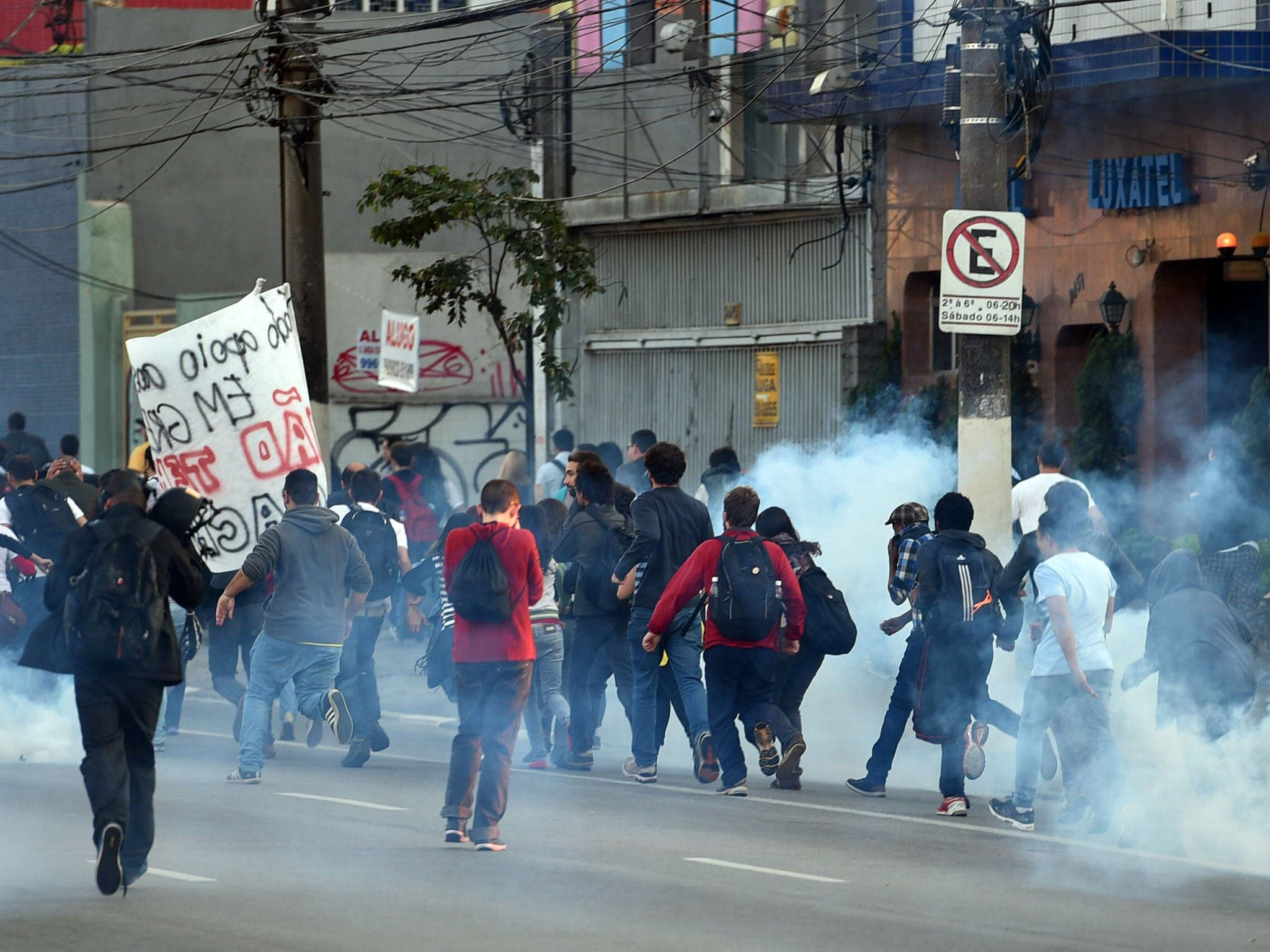World Cup 2014: Brazil’s subway workers vote on strikes ahead of opening match in Sao Paulo
Strike has been suspended but could return for Thursday after police fire on protesters with tear gas

Your support helps us to tell the story
From reproductive rights to climate change to Big Tech, The Independent is on the ground when the story is developing. Whether it's investigating the financials of Elon Musk's pro-Trump PAC or producing our latest documentary, 'The A Word', which shines a light on the American women fighting for reproductive rights, we know how important it is to parse out the facts from the messaging.
At such a critical moment in US history, we need reporters on the ground. Your donation allows us to keep sending journalists to speak to both sides of the story.
The Independent is trusted by Americans across the entire political spectrum. And unlike many other quality news outlets, we choose not to lock Americans out of our reporting and analysis with paywalls. We believe quality journalism should be available to everyone, paid for by those who can afford it.
Your support makes all the difference.Clashes with police in Brazil could continue right up to the opening game of the 2014 World Cup as striking subway workers prepared to vote on further action in Sao Paulo.
The city’s transport union is engaged in a disagreement over pay that has crippled its road network, angered commuters and seen police fire on protesters with tear gas.
Last night a statement on the union’s website said that the strike action would be suspended for Tuesday and Wednesday.
But leaders said a vote was yet to be held to determine whether workers will walk out on Thursday – the day hosts Brazil will open the World Cup against Croatia in Sao Paulo’s Arena Corinthians.
The stadium is located on the city’s outskirts, meaning access would be vastly restricted by a renewal of metro strikes.
Altino Prazeres, president of the union leading the strike, said almost all of the 8,000 subway employees had walked out in the past few days. As he marched with workers on a street in central Sao Paulo he insisted that their aim was not to disrupt the World Cup.
“I love soccer [football],” he said. “I support our national team. The point is not to stop the Cup. We want to resolve this today and all are willing to negotiate.”
The union is seeking a 12 per cent wage hike, but the government says it will not offer anything above 8.7 per cent. Meetings between government officials and union representatives on Monday stalled on that point.
There were hopes the work stoppage might be resolved sooner, as union officials met for the first time in days with government authorities in talks that continued into Monday night.
Earlier riot police fired tear gas to force about 100 striking workers out of the station on the fifth day of a subway strike that has thrown Sao Paulo's normally congested traffic into chaos.
“This is the way they negotiate, with tear gas and repression,” Alexandre Roldan, a union leader, said as he and others strikers regrouped outside the station following the confrontation.

The unions are also demanding that any striking workers who were dismissed over the weekend must have their jobs reinstated. Sao Paulo state's transport secretary, Jurandir Fernandes, told local reporters that 60 striking workers had been fired, and the state governor said yesterday that the dismissals were irreversible.
And in further bad news for Sao Paulo’ transport ministry, yesterday also saw a worker on the city’s high-profile monorail project killed when a large concrete support beam fell from an under-construction section of the 17.7km monorail track.
The monorail project is itself an example of a massive infrastructure which the Brazilian government said would be a positive legacy from hosting the World Cup.
But in 2011, just a year after construction began, officials had already declared that it would not be ready in time.
Fatal accidents, delays and strikes have long marred the build-up to the tournament throughout the country. Teachers remain on strike in Rio de Janeiro and routinely block streets with rallies. Police in several cities have gone on strike, though are currently back at work.
The walk-outs are in addition to a steady undercurrent of anti-government protests that began a year ago during huge demonstrations in dozens of Brazilian cities. Those demonstrations criticised government spending for the World Cup, and demanded big improvements in woeful public services like hospitals, schools, security and transportation.
The anti-government protests have greatly diminished in size but not in frequency. Demonstrations have repeatedly erupted in Brazil's metropolitan areas in recent months, with even a small number of protesters regularly blocking main roadways and severely disrupting traffic.
Join our commenting forum
Join thought-provoking conversations, follow other Independent readers and see their replies
Comments